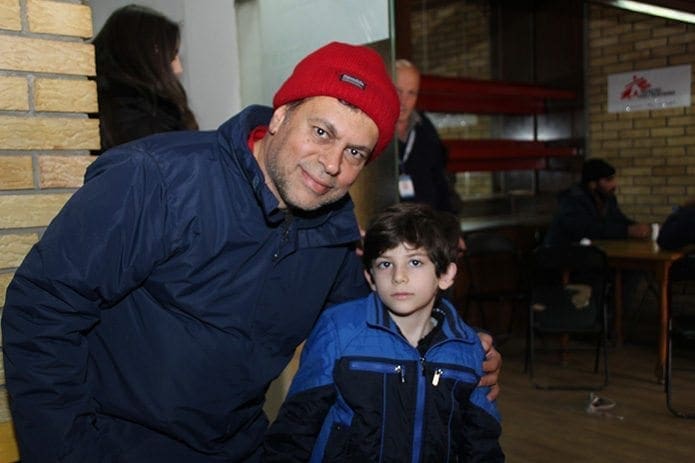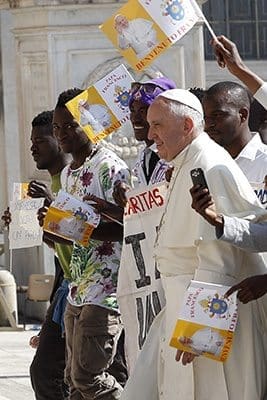 Photo By Mikaele Sansone/Catholic Relief Services
Photo By Mikaele Sansone/Catholic Relief ServicesThe refugee crisis in Europe from an eyewitness perspective
By DEACON STEVE SWOPE, Commentary | Published July 7, 2016
During the past year we have heard from politicians, church leaders and many others regarding the Syrian refugee crisis in the Balkans and Western Europe. Unfortunately, much of the discussion has been based upon murky facts or fiction and, in some cases, outright fear.
Numerous questions remain. Are the Syrian refugees really just people fleeing a civil war and ISIS to protect themselves and their families from death or persecution, or are they people looking to sneak into Western society for economic gain? Or are they terrorists? Why would they flee from a country that 10 years ago was perhaps the most educated, economically successful and modern country in the Middle East?
Answers and facts can seem elusive. As a result, when the truth is not self-evident we often move on and give little more thought to the sparse information we have.
Then something blasts through, so devastating and gut wrenching that we are forced to focus our attention on it—something that strikes us as horribly immoral, unjust and inhuman. Last September the world saw the image of 3-year-old Aylan Kurdi lying dead on a beach in Turkey. He was in a group of refugees trying to make their way to Greece when their boat capsized.
We looked at that picture and thought, “That could be any child. That could be my child.” Suddenly the death of a small child put a human face on a much larger human tragedy that was previously too easy to ignore.
Risk life, risk death
The reality that we see is a river of humanity stretching from Syria to northern Europe. Some 4.7 million Syrians have fled their homes, cities and country because they encountered an impossible choice: Stay where you are and face certain death from war or ISIS, or simply risk death as you flee for your lives.
Staying and fighting is not a choice at all; any military person knows that an unarmed, untrained civilian populace cannot fight an army or even well-armed terrorists.
So the refugees set out on a desperate journey. Roughly 2.7 million of them are in Turkey and around 1.2 million are in Lebanon, desiring to remain close to Syria in case peace returns. Many are headed to Europe, to countries with a tradition to reaching out to refugees.
During this journey the refugees are encountering significant hardships and are in need of the basic necessities of life: food, shelter, clothing and medical attention. Much of the aid is being provided by international aid agencies. The American Catholic Church is assisting the refugees through Catholic Relief Services, the official international aid agency of the church, operated by the U.S. Conference of Catholic Bishops.
As a CRS Global Fellow, I was invited to participate in a delegation that traveled to Greece and Serbia in January to meet refugees, find out why they were fleeing, hear what their hopes are, and see the response of the worldwide Christian community to the greatest refugee crisis since World War II.
In many ways, the stories the refugees told us were as unique as they are—but in one horrific way the stories were also the same. They were all refugees due to the death and destruction all around them.
Listening to one family’s story
A gentleman that I met named Ahmad Feres told me an all-too-familiar story. I met Ahmad and his son, Karam, at a medical clinic run by Doctors Without Borders at the Serbia-Croatia border. Before the war in Syria began, Ahmad had a job as an engineer in the city of Aleppo. He also taught on a part-time basis at the University of Aleppo. He has a master’s degree in engineering and is fluent in three languages, including English. He and his wife have three children: two boys, 7 and 12, and a 5-year-old daughter. Ahmad was at the clinic with the 7-year-old, who was not feeling well. This young son is fluent in both Arabic and English. And Ahmad’s elder son was an excellent student up until the time the schools closed in Aleppo three years ago. His younger children had not yet started school when the education system closed. Since that time, Ahmad and his wife have been doing the best they can to educate their children at home.

Pope Francis walks with refugees as he arrives to lead his general audience in St. Peter’s Square at the Vatican June 22. The pope invited more than a dozen refugees to sit near him on stage during his catechesis. CNS photo/Paul Haring
I asked Ahmad to tell me about the circumstances that led to them becoming refugees fleeing Syria. He told me that 18 months ago their home was destroyed in one of the attacks that have been raging around the city of Aleppo. He moved his family to another house and it was also destroyed in an attack. After moving to a third and then fourth house, which were also destroyed, the family ended up in a small room on the outskirts of town. The area was not safe as it was a continuing site of battles between the Assad regime and the rebels fighting against Assad.
Almost 80 percent of their home city has been destroyed, and basic services like electricity and water are no longer available. He told me that society had collapsed and life as they previously knew it was gone. To save his children, he and his wife decided to leave, that is, until peace returns. When that happens he will return home to Syria.
Ahmad told me, “I am Syrian and I loved my country. Why wouldn’t I go home?” And so Ahmad’s family, like the other refugees, continued their hard journey. I wish I knew if they made it to a place of safety and asylum.
My experience during the trip and the UN High Commissioner for Refugees’ reports match very well. About 65 percent of refugees are families; 20 percent are couples over the age of 55, and 15 percent are single men or women.
During their journey many die, especially during the dangerous crossing of the Aegean Sea from Turkey to Greece. In the first four months of 2016 some 1,700 human beings have died in the Aegean. Many more would have died from the lack of food, water, shelter and sanitation, except for the intervention of humanitarian agencies.
A responsibility to help
That brings me to what the American Catholic Church is doing.
In the parable that Jesus relates in Matthew 25:31-46, he tells us that what we do or do not do for the least of God’s children we do to him. It is one of the most vivid parables he ever spoke and the lesson is crystal clear: God will judge us in accordance with our reaction to human need.
The U.S. bishops recognize our collective responsibility to respond not only for the good of those in need but for our eternal salvation as well. In the true spirit of the parable of the Good Samaritan, the U.S. Catholic Church has seen the suffering of these refugees who are often considered the least, the other or the forgotten, and it has come to their aid. Since we all cannot fly to Turkey, the Balkans or Europe to provide help, our bishops have given us the ability to reach out through the structure of the Church, through CRS.
CRS has oversight of much of the work being carried out in the Balkans and collaborates with many religious and secular agencies to provide aid to the refugees. Organizations like Doctors Without Borders, the Ana and Vlade Divac Foundation, the Red Cross, Caritas and numerous Protestant denominations all work together to provide life-sustaining aid to the refugees.
Refugees are met as they arrive in Greece and given food, water and medical aid when needed, as well as legal counseling. Children have a chance to play with volunteers from Save the Children while their parents try to figure out the next steps to take. Never is a single question asked about the refugee’s religion or politics. As the Good Samaritan did, aid is provided without discrimination or condition.
The volunteers are all young and enthusiastic. Typical of the volunteers we met was a wonderful young woman named Tadia Rastic, an interpreter in Serbia who works with refugees to explain next steps and offer necessary assistance. It gives great comfort and reduces anxiety for refugees to speak with someone who knows their language.
A woman who was more than seven months pregnant came to the refugee transfer station feeling a great deal of pain. She assumed it was from the stress of the journey. Tadia urged her to go to a medical room where doctors in the clinic then arranged to transport her to a local hospital. Her serious medical condition was treated, her daughter was born, and after a few days’ rest she was given medicine for the onward trip. Tadia’s actions saved the life of the baby and possibly the mother. For Tadia it was just another day caring for people in need—for the woman it meant life itself. Her gratitude was so great that she named her daughter Tadia after the woman who had saved her life.
‘A common bond’
During our trip we heard many more stores and saw countless dedicated workers providing simple and necessary aid to those in need. Humanity is the common bond that we all share despite differences in country, language, culture, religion or custom. That common bond, the dignity of each human person made in the image and likeness of God, is called solidarity. The Gospel calls us to live in solidarity with our brothers and sisters, who cannot be the “stranger” or the “other” to a Christian.
Today out of a total of 19 million refugees worldwide, there are 4.7 million Syrian refugees. Jesus never turned his back on those in need, and he never taught that helping those in our own family, community or nation comes first. In fact, in the parable of the Good Samaritan, he tells us the exact opposite and the truth.
We are called to help all in need, without question and without condition. That call includes the Syrian families who are struggling to survive after their decision not to die in a bloody civil war or at the hands of ISIS. While we couldn’t save the life of little Aylan, you and I can make a profound difference. Through our prayers, advocacy, support and actions, we can provide life to others.
Deacon Steve Swope is a deacon from the Archdiocese of Atlanta, serving at St. George Church, Newnan. For more stories and insight, visit his website: www.DeaconsView.com.